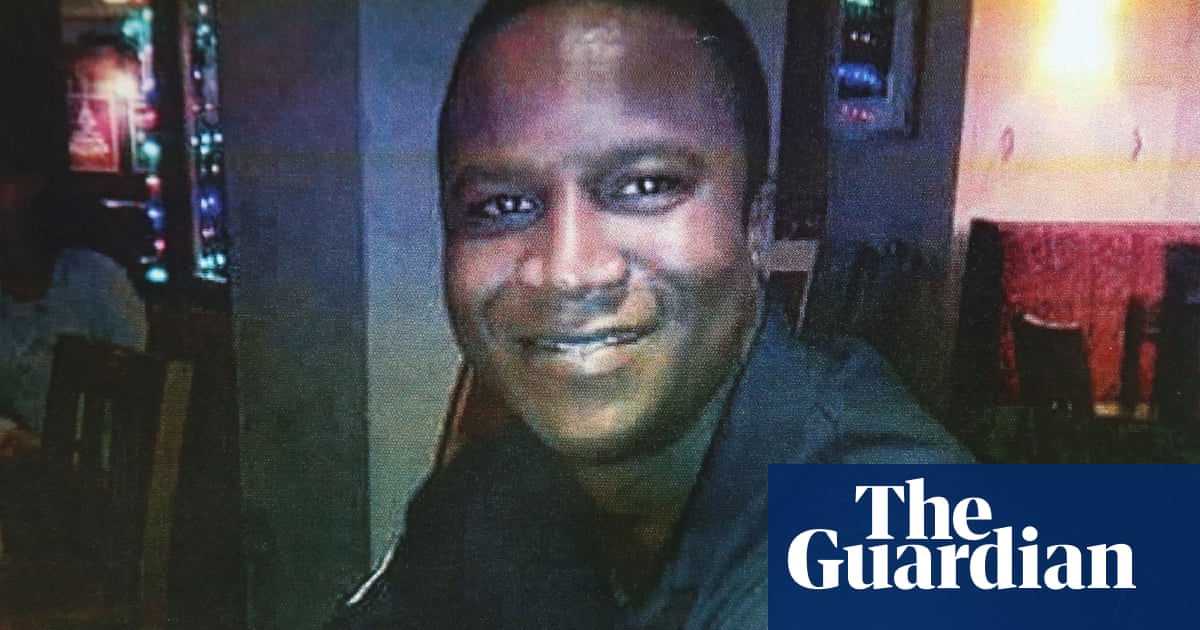
An attack by a police officer on the former footballer Dalian Atkinson, in which he was shot with a Taser stun gun for 33 seconds and kicked twice in the head, “made a significant contribution to his death”, a jury has heard.
PC Benjamin Monk denies the murder and manslaughter of Atkinson, 48, on 15 August 2016 in Telford, Shropshire.
Monk and his colleague PC Mary Ellen Bettley-Smith were sent to Meadow Close, where Atkinson’s father, Ernest, then lived, after neighbours became concerned after hearing shouts.
The two officers were accused in court on Wednesday of “colluding” in their accounts of why they had used continued force against Atkinson. The barrister for Monk accepted the officer had twice kicked Atkinson in the head, but told the court it was in self defence.
Bettley-Smith denies assault after repeatedly striking Atkinson with a baton during the six-minute incident, which started just after 1.30am.
The jury heard Atkinson had been behaving erratically, claiming to be the messiah. Monk claimed the former football star had said: “I am going to take you to the gates of hell.”
Two attempts to subdue Atkinson with a Taser stun gun failed but a third attempt felled him to the ground and Monk then kicked him in the head twice, the jury heard.
In dispute is what role the force that was used after the Taser weapon was fired for the third time played in Atkinson’s death, and whether it was lawful, the jury heard.
Alexandra Healy QC, the prosecutor, told the jury at Birmingham crown court that medical evidence from three experts showed unlawful force used by Monk was to blame for Atkinson’s death.
Atkinson had health conditions including an enlarged heart and kidney disease, but Healy said that nonetheless three prosecution experts “agreed that whilst Dalian Atkinson’s enlarged heart meant that he could have died at any time”, the prolonged use of the Taser weapon and the kicks to his head “made a significant contribution to his death”.
Healy said stress such as the prolonged Taser weapon use and kicks to the head left Atkinson at risk of fatal cardiac arrhythmia.
Healy said the experts would say that Atkinson was unconscious after having had the Taser fired at him for 33 seconds, and they “were in no doubt that being rendered unconscious made a significant contribution to Dalian Atkinson’s death”.
This is because unconsciousness damaged his ability to breathe, dangerous for anyone but more so in Atkinson’s case.
Healy said this was because “impaired breathing for someone with an enlarged heart is inherently dangerous. In the end the heart will just stop.” The kidney disease also meant he was at greater risk.
Healy told the jury: “In their view the most likely explanation for Dalian Atkinson’s unconsciousness is the kicks to the head. Even if the kicks did not cause unconsciousness, because Dalian Atkinson was already unconscious when they were delivered, the kicks still made a significant contribution to death because they would in those circumstances have inevitably extended the period of unconsciousness.“
In an interview after the former footballer’s death, Monk insisted he had only kicked Atkinson once while he was on the ground, and in the shoulder.
Both officers claimed the force used was in “reasonable self-defence”, and they feared Atkinson could still get up.
Healy said: “Delivering two forceful kicks to Dalian Atkinson’s head cannot have been an act in reasonable self-defence. It is difficult to see how a kick to the head could ever be a reasonable act taken to prevent Dalian Atkinson from getting up. It is impossible to see how two kicks could be.”
In the interview Monk said he and his fellow officer, with whom he was in a relationship at the time, were terrified and had at one stage backed off when faced with Atkinson’s erratic behaviour.
Healy said: “The prosecution say once that last Taser deployment had been totally effective, causing Dalian Atkinson to fall to the ground as a result of neuromuscular incapacitation, the officers were no longer acting in self-defence. Rather they acted in anger as a result of the fear Dalian Atkinson had just put them through.”
Healy said Monk, who at first claimed only to have kicked Atkinson once in the shoulder, knew he had kicked him twice in the head. “He knows that is impossible for him to justify as reasonable self-defence.”
Monk’s barrister, Patrick Gibbs QC, said the defence would dispute the medical evidence, and the officers’ intention was to protect Atkinson’s father and keep themselves safe, with Atkinson’s behaviour having left the officer at times terrified.
Gibbs said: “It is not in dispute that Mr Monk must have kicked Dalian Atkinson twice in the head. What is in dispute is why did he do that?
“He has always said he was terrified and that Mr Atkinson, after that third Taser had been effective, initially at least, he was trying to get up.”
Healy said the medical evidence showed repeated baton strikes by Bettley-Smith had not directly contributed to Atkinson’s death, and nor did the former Aston Villa striker have any defensive wounds on the hands or forearms.
The first witness the jury heard from was Karen Wright, Atkinson’s partner, who described his erratic behaviour hours before he came face to face with police.
Wright, at times visibly upset, said the couple were at home when Atkinson said: “You’ll see when I am dead, I am the messiah.” She said Atkinson had also feared “the NHS or police” would kill him.
Atkinson yanked out a dialysis line, needed to treat his kidney problem, and decided he wanted to visit his father’s house, which he considered “home”.
Wright said she “begged” him not to go because it was late and he was due in hospital for treatment the next day, but Atkinson borrowed her Porsche and drove to his father’s home.
The trial continues.












